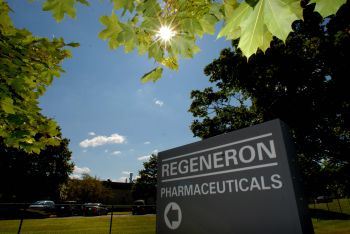
Sanofi and Regeneron in immuno-oncology push
pharmafile | July 28, 2015 | News story | Manufacturing and Production, Research and Development | Cancer, PD-1 inhibitors, Regeneron, Sanofi, collaboration, immuno-oncology, pd-1
Pharma giants Sanofi and Regeneron are extending the partnership that brought new heart drug Praluent to the market, with a $2 billion deal to develop new antibodies to treat cancer.
This week the companies’ high cholesterol drug, Praluent (alirocumab) earned approval by the FDA and a positive recommendation from the EMA. The drug is a human monoclonal antibody targeting a protein called PCSK9 (proprotein convertase subtilisin/kexin type 9).
The collaboration between the two companies will concentrate on finding new immuno-oncology anti-cancer antibodies. In particular, the companies plan to take on current immuno-oncology leaders Bristol-Myers Squibb and Merck, by developing and bringing to market a programmed cell death protein 1 (PD-1) inhibitor to challenge Opdivo (novolumab) and Keytruda (pembrolizumab).
Sanofi and Regeneron currently have an investigational contender in Phase I testing, and plan to start clinical trials in 2016. The companies have other pipeline drugs in development, including antibodies to lymphocyte-activation gene 3 (LAG3) and glucocorticoid-induced tumour-necrosis-factor-receptor-related protein (GITR). The pairing will also explore antibodies that target blood and solid cancers, either as monotherapies or in combination with other immune-modulating treatments.
Sanofi will make an upfront payment to Regeneron of $640 million, and the companies will invest $1 billion in a Phase IIa study of monotherapy and novel combinations of immuno-oncology antibody candidates.
The companies will also go halves on an additional $650 million for development of REGN2810, a PD-1 inhibitor. In addition, Sanofi will pay Regeneron a one-time milestone of $375 million if sales of a PD-1 product or any other collaboration antibody sold for use in combination with a PD-1 product exceed $2 billion in any consecutive 12-month period.
Finally, the two companies have agreed to re-allocate $75 million over three years for immuno-oncology antibodies, from Sanofi’s $160 million annual contribution to the collaboration.
“The Sanofi-Regeneron Alliance has demonstrated its ability to translate cutting-edge science into ground-breaking medicines for patients with serious needs,” says Elias Zerhouni, who is president of global R&D at Sanofi.
“With more than eight years of successful collaboration between us, I am confident in our ability to advance these novel programs. In addition to PD-1, the collaboration brings together a range of validated, innovative preclinical programs that have unique potential to help patients either as monotherapy or in combination approaches.”
“The field of immuno-oncology has shown the potential to dramatically improve outcomes for patients with certain types of cancer – however, the field is still in its very early days,” says George Yancopoulos, chief scientific officer at Regeneron.
“We believe the approaches most likely to deliver the best results to patients will combine multiple innovative therapies acting on different pathways and targets both in the tumour and the body’s immune response – and precisely target these medicines to the right patient.”
Lilian Anekwe
Related Content

Sanofi shares results for phase 3 LUNA 3 trial in immune thrombocytopenia
Sanofi has announced positive results from its phase 3 LUNA 3 study, which assessed rilzabrutinib …

Medincell and AbbVie enter agreement for development of next-generation injectables
Medincell and AbbVie have announced that they have entered into a collaboration to co-develop and …

Geneos Therapeutics shares data from phase 1/2 trial for cancer vaccine
Geneos Therapeutics has announced that it has published positive safety, immunogenicity and efficacy data from …







